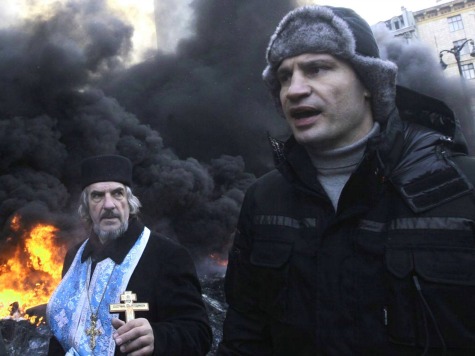
Vitali Klitschko thought he knew corruption from boxing. Wooed by Don King, the Klitschko brothers were wowed when they heard the fight promoter gracefully play parts of Mozart’s “Don Giovanni” on his piano. King’s worldliness especially captivated Vitali, a PhD in sports science, whose interests even then wandered well beyond the ring.
Who was this self-made millionaire who effortlessly plays classical piano in his leisure?
“I walked around the side and saw that it was all a fake,” Vitali explained on an HBO documentary. “The piano was playing itself. I could see one of the pedals moving without him touching it.” The brothers thought the better of embarking upon a business venture with the shock-topped ex-con.
More so than any brutality Klitschko endured in the ring–and a glimpse of his face after his 2003 bout with Lennox Lewis attests that he has occasionally taken what he has dished out–Don King’s player-piano provided the best dress rehearsal for what Vitali encountered in his homeland as he transitioned from world boxing champion to Ukrainian political challenger.
The dissent aimed at the government from the thrice-failed Kiev mayoral candidate hit as hard as his punches. The state at first punched back. When thugs beat up a reporter exposing government corruption, authorities strangely blamed the towering opposition leader. “Instead of conducting an objective investigation and finding who really ordered and carried out the beating of Tetyana Chornovil, the ministry of [Vitaliy] Zakharchenko turns to provocation and effectively tries to conceal the criminals,” Klitschko responded late last year. Later, various news agencies reported that the state offered enormous bribes to Klitschko to steer him clear from politics. But Klitschko rebuffed the offers as he had once rebuffed Don King’s.
A prizefighter’s eschewal of prize money may surprise. A prizefighter’s embrace of the fight doesn’t. Late last month, when Ukrainians clashed with the state, Klitschko manned the barricades and inspired the Ukrainians who overthrew the government. “Tomorrow we will go forward together,” he remarked to followers during the bloodshed in the capital. “And if it’s a bullet in the forehead, then it’s a bullet in the forehead.” Russia’s subsequent military intervention into their weaker neighbor’s affairs similarly impelled the son of a Soviet general to stand up against more powerful forces. He declared, “Parliament must ask the army’s commander-in-chief to declare national mobilization after the start of Russian aggression against Ukraine.”
It is this spirited, fiery underdog that boxing fans might not recognize. Like Viktor Yanukovych, the president he helped unseat, and the Russian invaders he hopes to expel, Klitschko almost always entered the fray as the favorite. And he competed robotically, devoid of the humanity that often tethers fans to fighters. He plodded toward outmatched opponents and punched through them with mechanized precision. Optimus Prime could identify with him. The guy in the upper balcony? Not really. Klitschko didn’t float like a butterfly like Muhammad Ali. He didn’t win in the stare down or erupt in a frenzy of power like Mike Tyson. He certainly didn’t need to bravely bob-and-weave himself inside the range of larger opponents like peekaboo-puncher Joe Frazier. Goliath beat down Davids for a living, and he employed size, strength, conditioning, and accuracy to do so. Now he plays the part of Chris Arreola, Tomasz Adamek, Orlin Norris–not Vitali Klitschko. The small man taking up a stone against the giant remains an unfamiliar role for Dr. Ironfist.
The lone black mark of Klitschko’s career came against a David personified, the slick and quick Chris Byrd. The blown-up cruiserweight who fought as the lightest of elite heavyweights. And as a follower of Christ, Byrd surely internalized the Biblical analogy before commentators started making it. In their 2000 match, Klitschko, well ahead on the scorecards, suffered a torn rotator cuff. He could have danced to victory over the last three rounds. Instead, he quit on the stool after the ninth frame in a “no mas” moment for the heavyweight division. The knock on Klitschko from then on was that a fighter blessed enormous fists was cursed with a small heart.
Those thundering hands and that iron jaw meant that the heavyweight champion never really got the chance to display his heart. Unlike his brother Wladimir, who tasted the canvas against Lamon Brewster, Sam Peter, and others, Vitali Klitschko has never been down let alone out during his professional boxing career. In the political ring as in the boxing ring, contenders get knocked down to rise and fight again. It’s why we watch. But Klitschko, 41 of whose 45 victories came via knockout (a staggering percentage even in the heavyweight division), has watched others rise up and fight. In the boxing ring, at least, dragging himself off the deck remains an unfamiliar experience for the puncher-turned-politician.
That’s what he’s tasked with in the Ukraine, uplifting a country beset by corruption, political unrest, and economic hardship. Though his dominance necessarily negated any demonstrations of in-ring resilience, he has shown that quality in his political career, refusing to give up after numerous unsuccessful tries for public office. Alongside his younger brother Wladimir, Vitali Klitschko could spot the machinations of Don King. But Viktor Yanukovych, the recently ousted president, earned Klitschko’s support when he won the office after the Orange Revolution. How does the man not fooled by the player-piano not become, as Yanukovych ultimately became, the fool behind the player-piano?
Vitali Klitschko spent his career ducking a bout with the other major heavyweight of his era, younger brother Wladimir. His retirement from the sport has been spent running toward a fight in his native Ukraine.

COMMENTS
Please let us know if you're having issues with commenting.